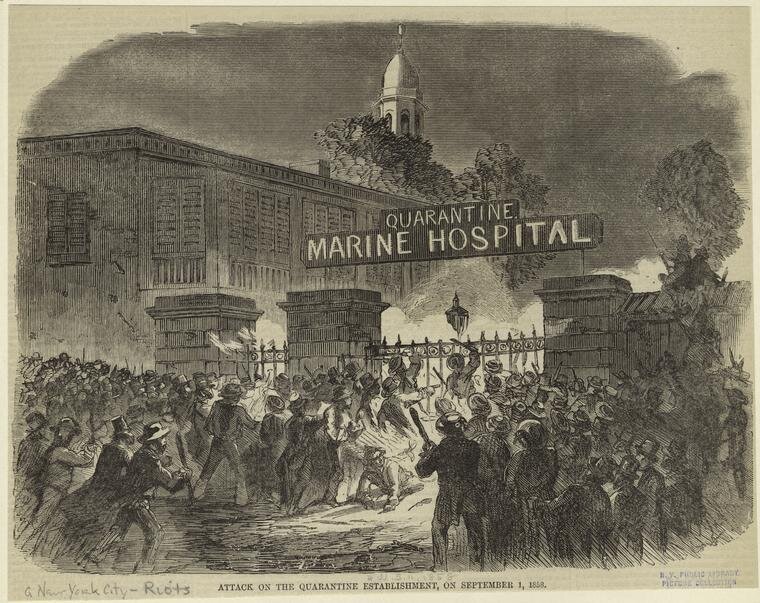Epidemic City: Infectious Disease and the Making of Early New York
“Attack on the Quarantine Establishment” (Staten Island), New York Public Library Digital Collection, 809552.
The COVID-19 pandemic has taken a huge bite out of the Big Apple. New Yorkers have experienced seismic changes in their daily lives as this disease has disrupted their work, recreation, mobility, personal and familial activities, and social relations. Yet the coronavirus is only one of the most recent pathogens to have visited New York City and wreaked havoc on its residents. Since the founding of New Amsterdam as a Dutch trading post in 1624, numerous outbreaks of infectious diseases — including smallpox, measles, yellow fever, cholera, influenza, and AIDS — have transformed the region’s demographic, political, and cultural landscapes.
In this seminar, we will explore how infectious disease transformed New York City during its first three centuries. We will also pay particular attention to two outbreaks that hit New York City shortly after the birth of the United States: the yellow fever epidemics of the 1790s and the cholera pandemics of the 1830s. In addition to examining how medical practitioners diagnosed the causes and symptoms of diseases and implemented treatments, we consider how earlier disease outbreaks in New York City shed light on current issues and concerns associated with COVID-19. To this end, we will consider some of the following issues and questions: how previous experiences with infectious diseases resulted in a more active government presence at the municipal and state levels; how governments created new health policies and regulations; how personal and social understandings of disease shaped class, ethnic, and race relations among New York City’s diverse population; and how beliefs regarding religion and morality shaped responses to health crises. Our readings will include an array of primary sources (medical treatises, diaries, letters, newspapers, sermons, reform tracts, and government documents), as well as selected secondary readings by historians of early America, historians of medicine, and others.
Tuesdays & Thursdays (4/13-29), 6:30-8PM (ET)
$275 (6 sessions, 90 min. each)
Robb Haberman, PhD, is an Associate Editor of The Selected Papers of John Jay at Columbia University’s Rare Book & Manuscript Library. His writing on literary culture and local identity in post-Revolutionary New York City has appeared in Early American Studies and American Periodicals. His current research explores the intersections of partisanship, defensive planning, and historical memory in Federalist New York. Robb has taught courses on disease in early America at the University of Denver and Trinity College (Hartford).
